Charles E W Bean, Diaries, AWM38 3DRL 606/2/1 - January - March 1915 - Part 7
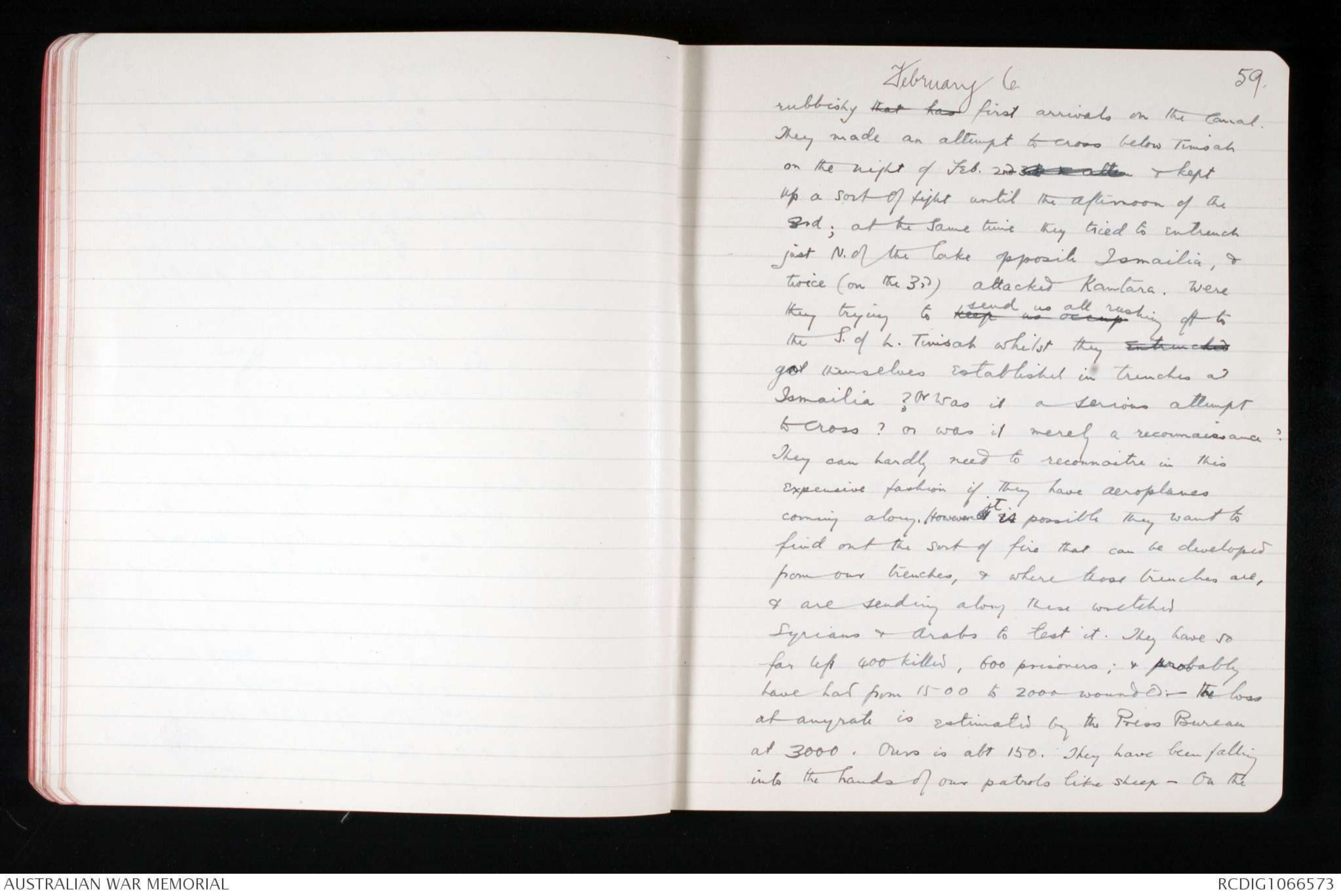
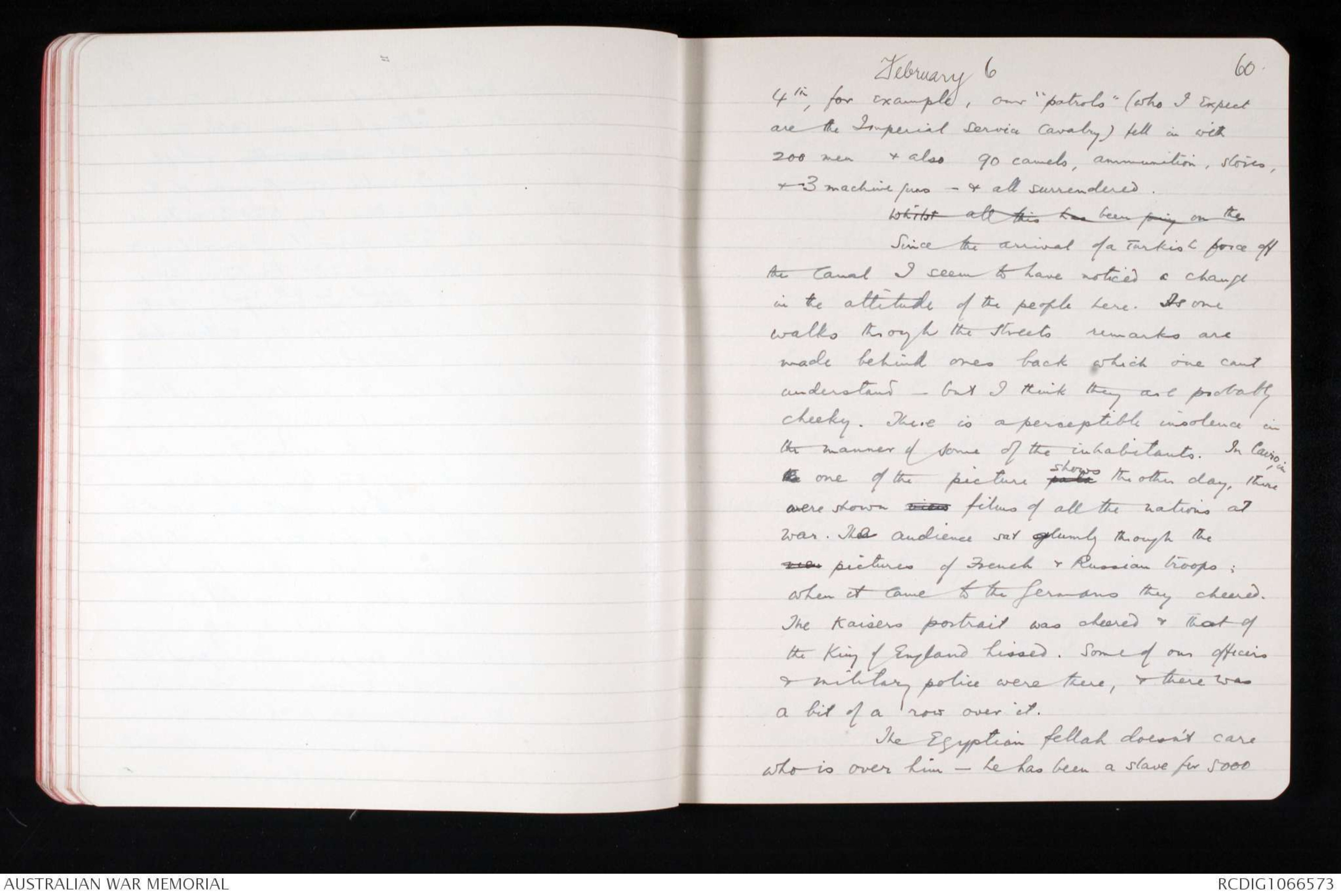
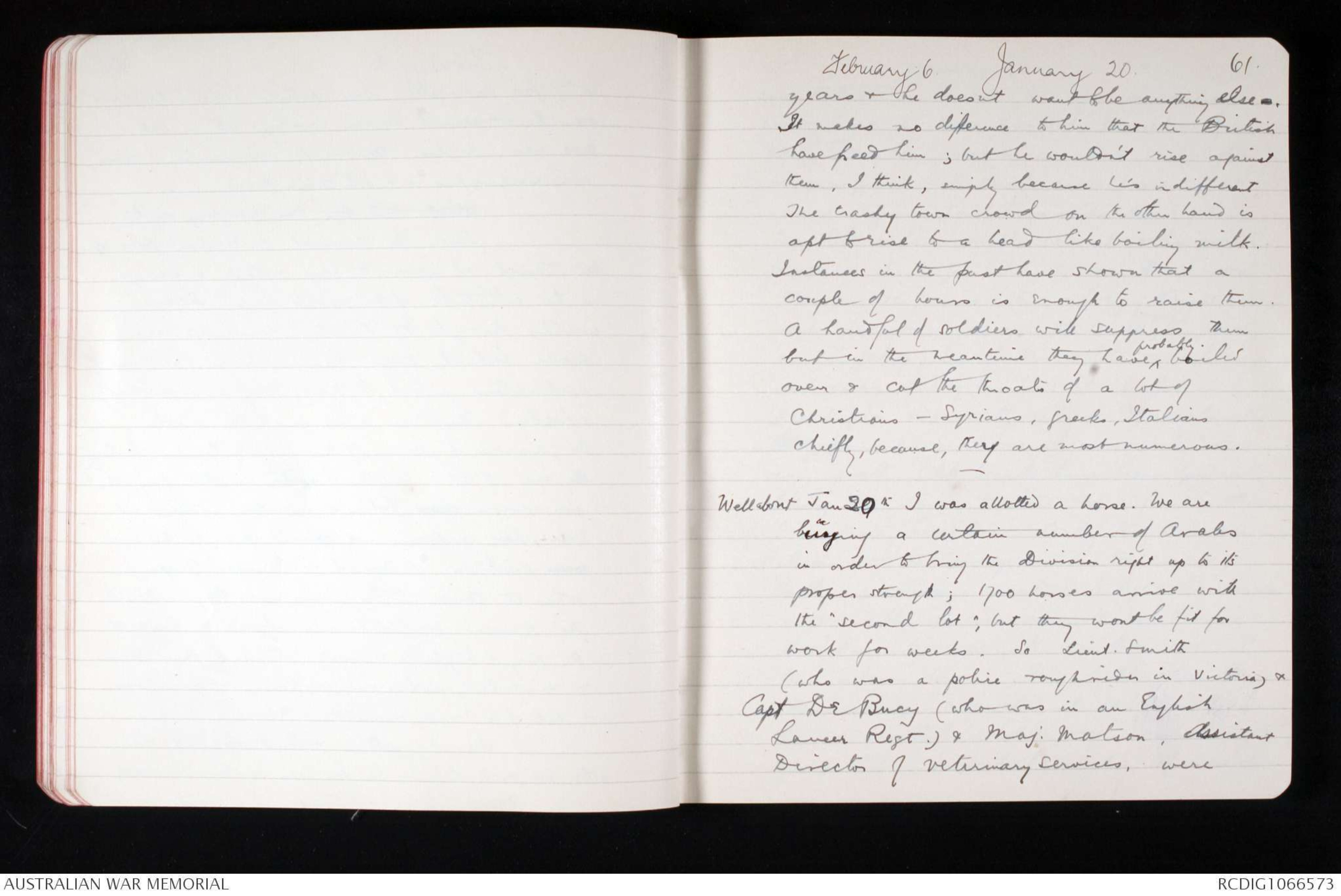
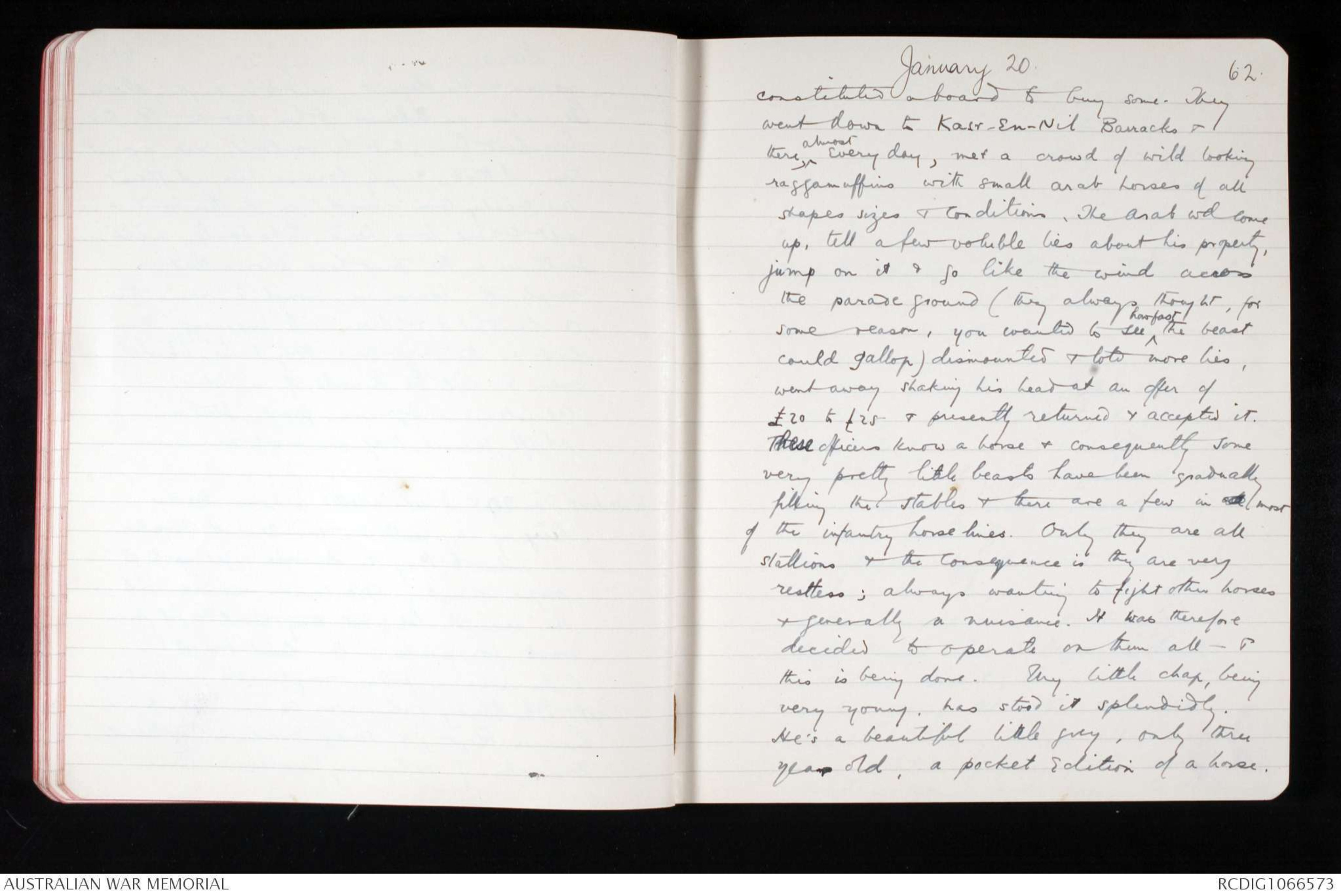
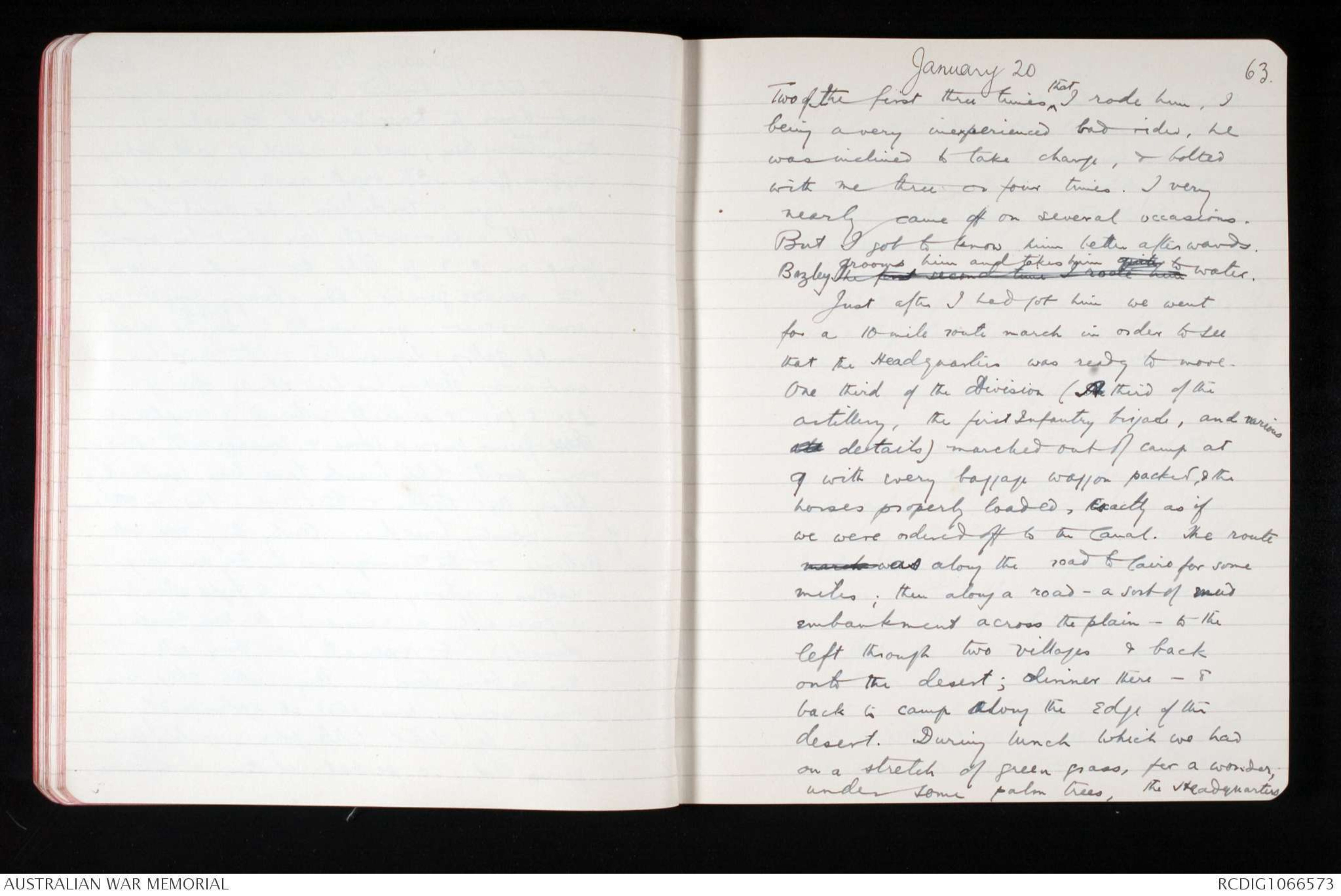
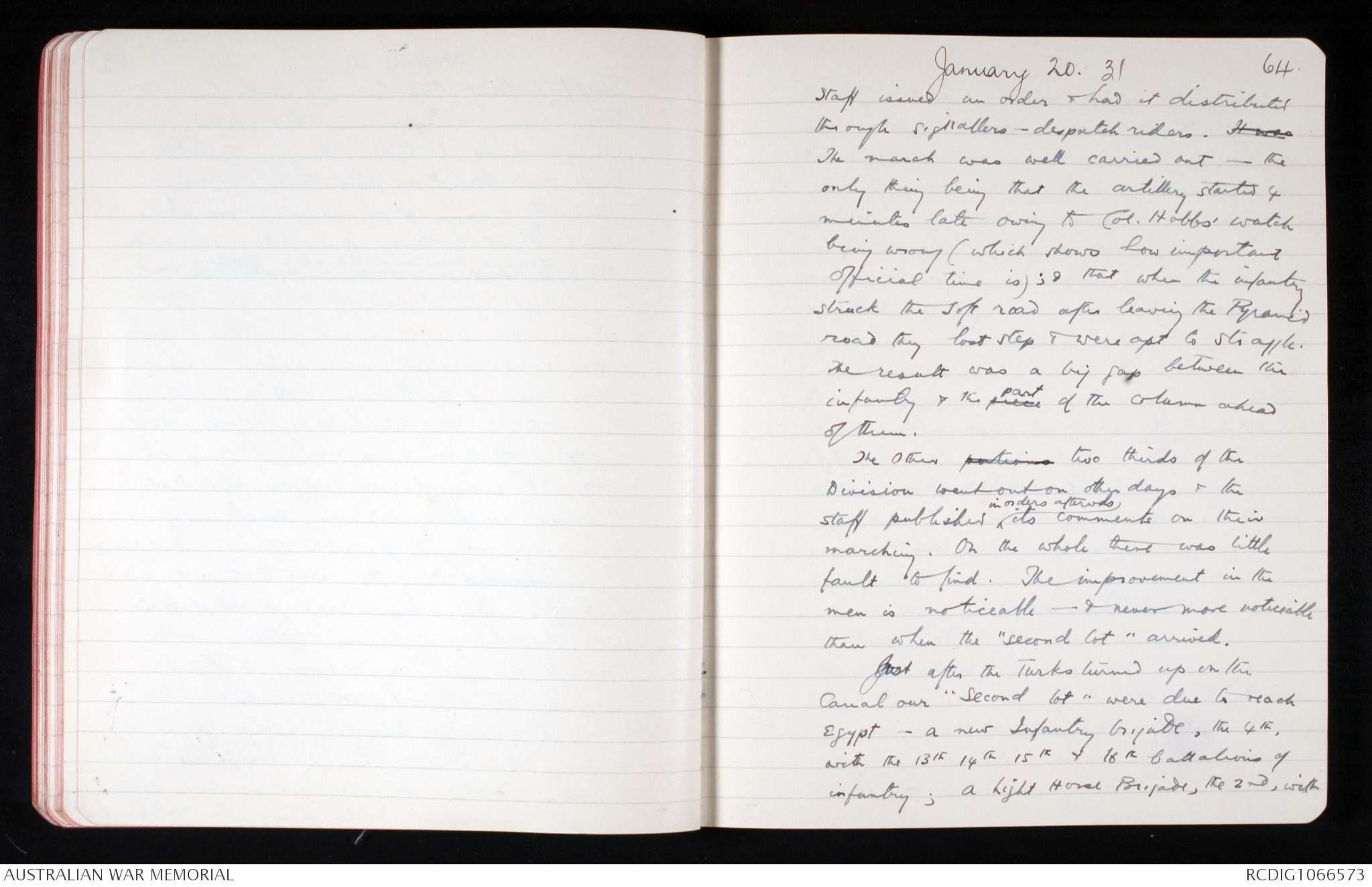
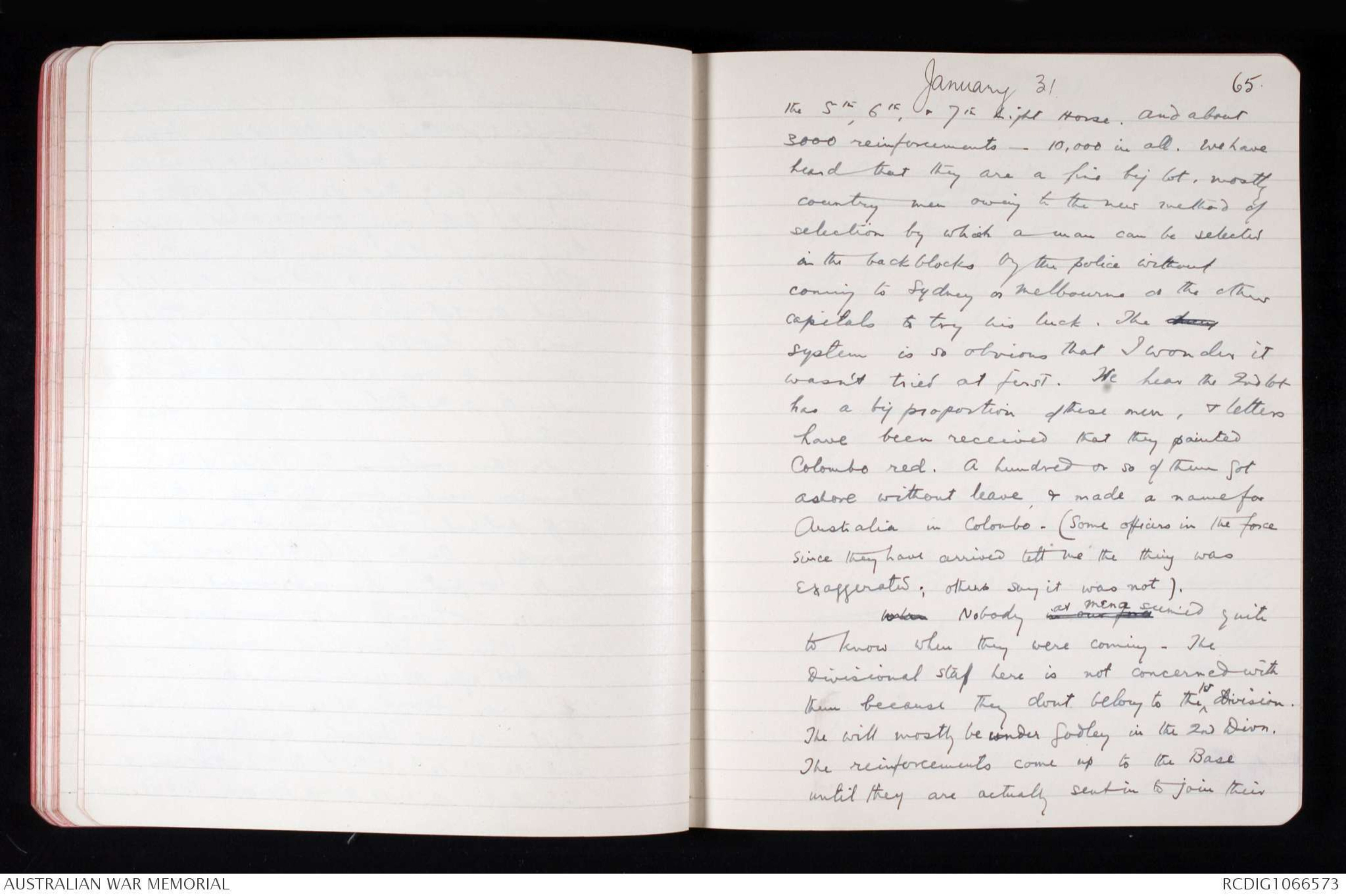
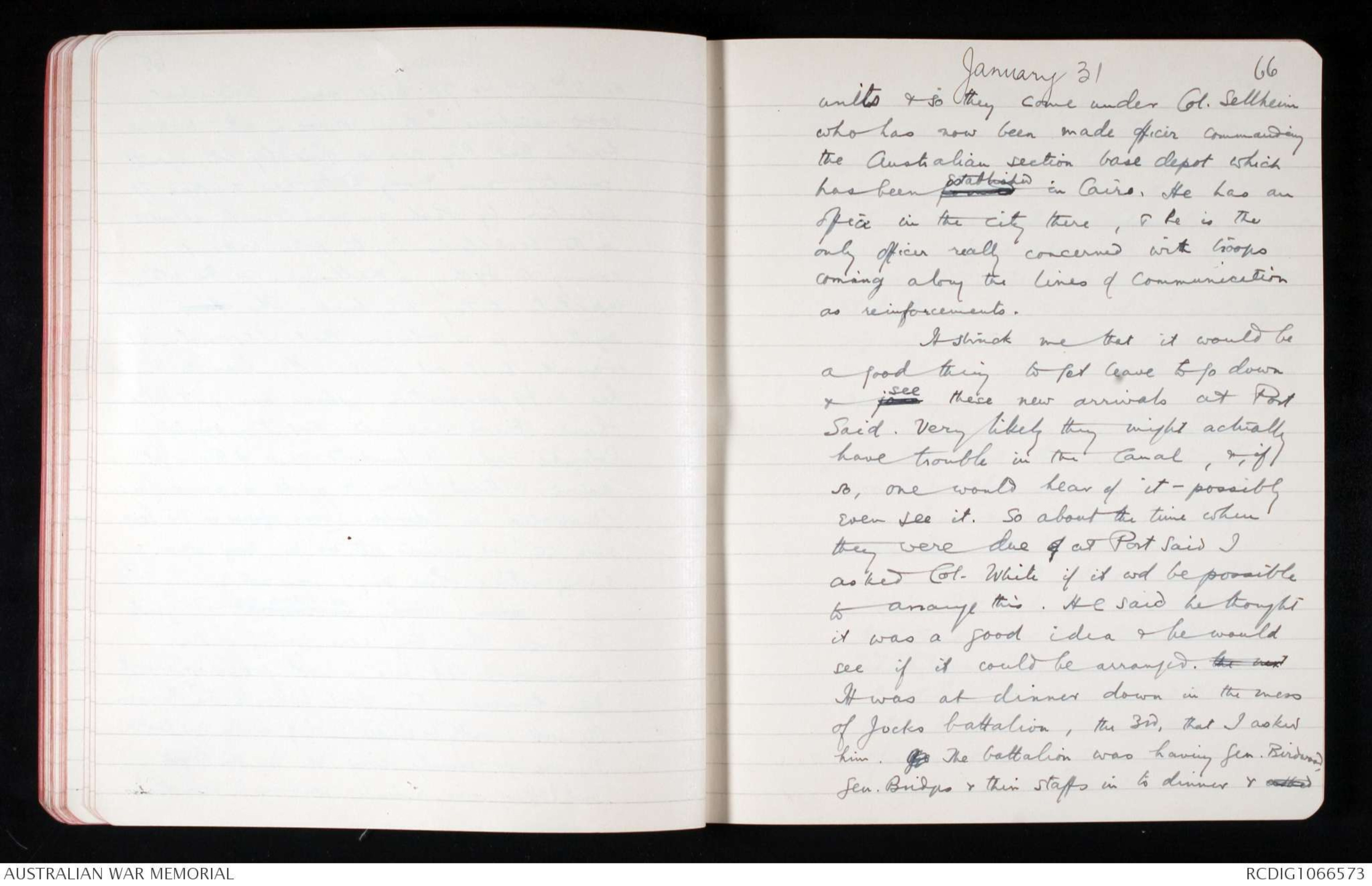
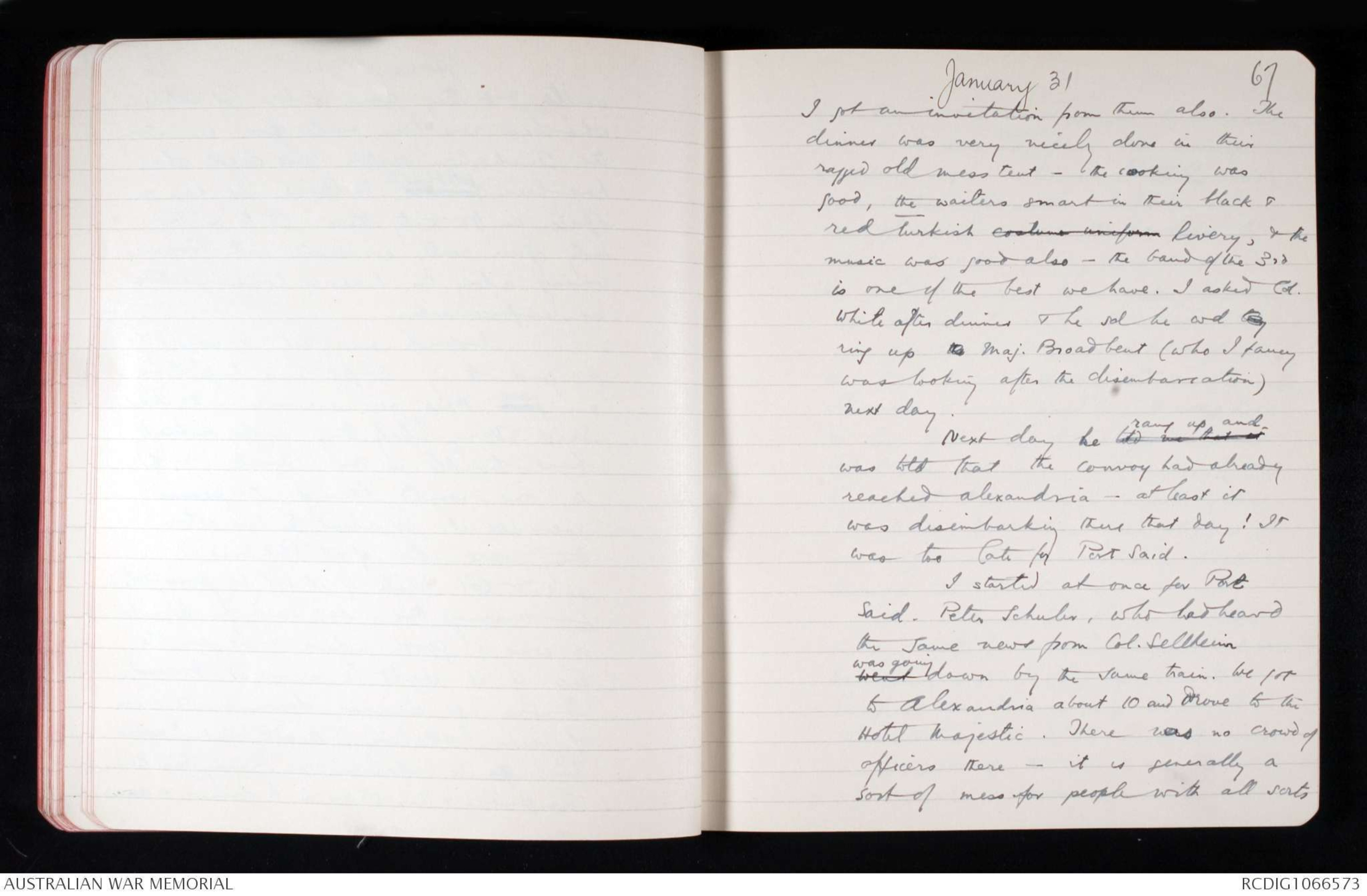
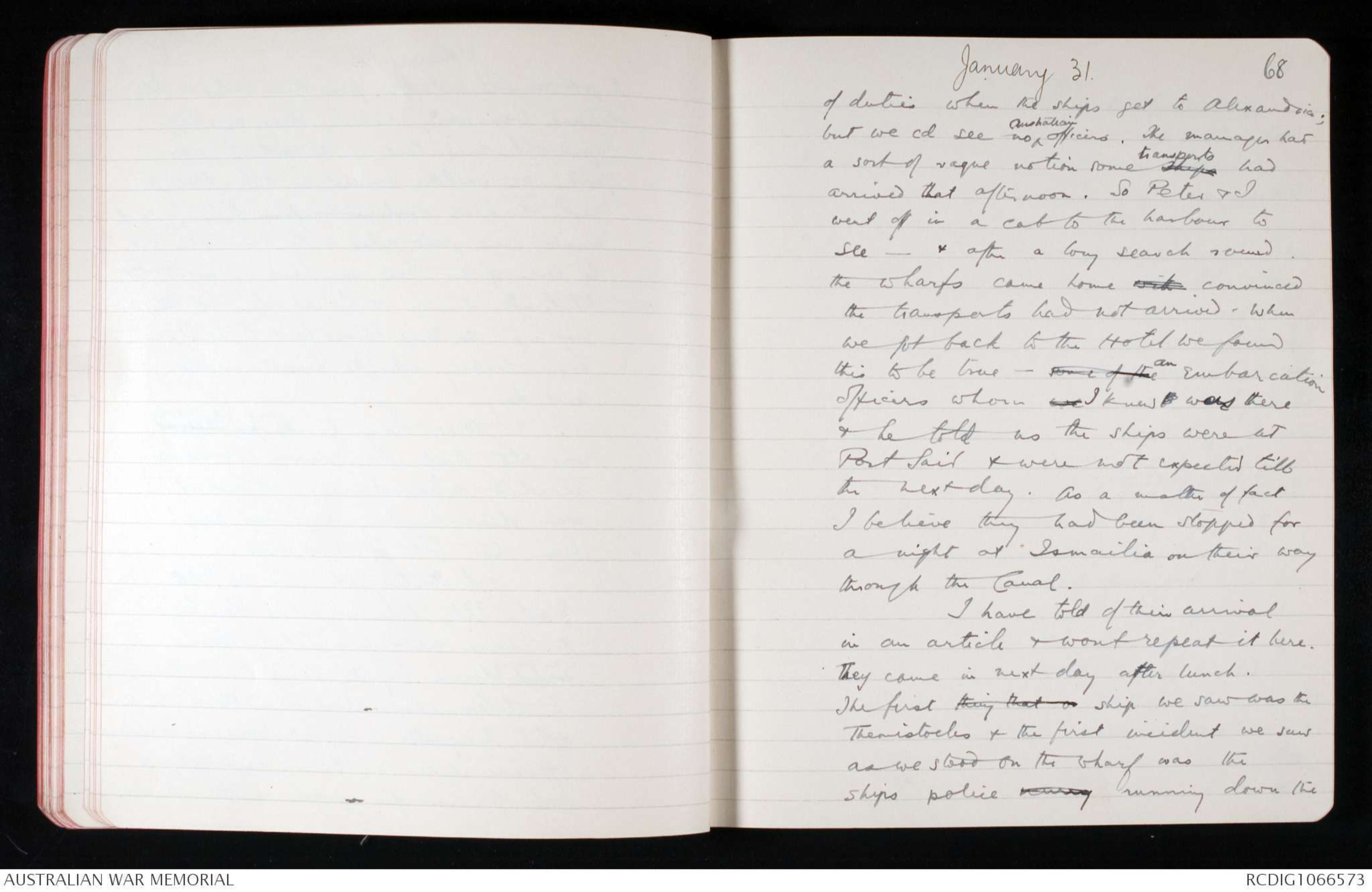
February 6. 59.
rubbishy that has first arrivals on the canal.
They made an attempt to cross below Timsah
on the night of Feb. 2nd 3rd & alter & kept
up a sort of fight until the afternoon of the
3rd; at the same time they tried to entrench
just N. of the lake opposite Ismailia, &
twice (on the 3rd) attacked Kantara. Were
they trying to keep us occup send us all rushing off to
the S. of L. Tinisah whilst they entrenched
got themselves established in trenches at
Ismailia ? or was it a serious attempt
to cross ? or was it merely a reconnaissance ?
They can hardly need to reconnoitre in this
expensive fashion if they have aeroplanes
coming along. However xx it is possible they want to
find out the sort of fire that can be developed
from our trenches, & where those trenches are,
& are sending along these wretched
Syrians & Arabs to test it. They have so
far left 400 killed, 600 prisoners; & probably
have had from 1500 to 2000 wounded - the loss
at any rate is estimated by the Press Bureau
at 3000. Ours is abt 150. They have been falling
into the hands of our patrols like sheep - On the
February 6 60.
4th, for example, our "patrols" (who I expect
are the Imperial Service Cavalry) fell in with
200 men & also 90 camels, ammunition, stores,
& 3 machine guns - & all surrendered. Whilst all this has been going on the
Since the arrival of a Turkish force off
the Canal I seem to have noticed a change
in the attitude of the people here. As one
walks through the streets remarks are
made behind ones back which one cant
understand - but I think they are probably
cheeky. There is a perceptible insolence in
the manner of some of the inhabitants. In Cairo, inthe one of the picture parlo shows the other day, there
were shown view films of all the nations at
war. The audience sat glumly through theview pictures of French & Russian troops;
when it came to the Germans they cheered.
The Kaisers portrait was cheered & that of
the King of England hissed. Some of our officers
& military police were there, & there was
a bit of a row over it.
The Egyptian fellah doesn't care
who is over him - he has been a slave for 5000
February 6. January 20. 61.
years & he doesn't want to be anything else.
It makes no difference to him that the British
have freed him; but he wouldn't rise against
them, I think, simply because he's indifferent
The trashy town crowd on the other hand is
apt to rise to a head like boiling milk.
Instances in the past have been shown that a
couple of hours is enough to raise them.
A handful of soldiers will suppress them
but in the meantime they have ^ probably boiled
over & cut the throats of a lot of
Christians - Syrians, Greeks, Italians
chiefly, because, they are most numerous.
Well about Jan 20th I was allotted a horse. We are
buying a certain number of Arabs
in order to bring the Division right up to its
proper strength; 1700 horses arrive with
the "second lot", but they wont be fit for
work for weeks. So Lieut. Smith
(who was a police roughrider in Victoria) &
Capt De Bucy (who was in an English
Lancer Regt.) & Maj. Matson, Assistant
Director of Veterinary Services, were
January 20. 62.
constituted a board to buy some. They
went down to Kasr-En-Nil Barracks &
there, ^ almost every day, met a crowd of wild looking
raggamuffins with small arab horses of all
shapes sizes & conditions. The arab wd come
up, tell a few voluble lies about his property,
jump on it & go like the wind across
the parade ground (they always thought, for
some reason, you wanted to see ^ how fast the beast
could gallop) dismounted & told more lies,
went away shaking his head at an offer of
£20 to £25 & presently returned & accepted it.
These officers know a horse & consequently some
very pretty little beasts have been gradually
filling the stables & there are a few in xx most
of the infantry horse lines. Only they are all
stallions & the consequence is they are very
restless; always wanting to fight other horses
& generally a nuisance. It was therefore
decided to operate on them all - &
this is being done. My little chap, being
very young, has stood it splendidly.
He's a beautiful little grey, only three
years old, a pocket edition of a horse.
January 20 63.
Two of the first three times ^ that I rode him, I
being a very inexperienced bad rider, he
was inclined to take charge, & bolted
with me three or four times. I very
nearly came off on several occasions.
But I got to know him better afterwards.
Bazley grooms him and takes him quietly to water. the first second time I rode him
Just after I had got him we went
for a 10 mile route march in order to see
that the Headquarters was ready to move.
One third of the Division (A third of the
artillery, the first Infantry brigade, and variousoth details) marched out of camp at
9 with every baggage waggon packed, & the
horses properly loaded, exactly as if
we were ordered off to the Canal. The routemarch was along the road to Cairo for some
miles; then along the road - a sort of mud
embankment across the plain - to the
left through two villages & back
onto the desert; dinner there - &
back to camp along the edge of the
desert. During lunch which we had
on a stretch of green grass, for a wonder,
under some palm trees, the Headquarters
January 20. 31 64.
staff issued an order & had it distributed
through signallers - despatch riders. It was
The march was well carried out - the
only thing being that the artillery started 4
minutes late owing to Col. Hobbs' watch
being wrong (which shows how important
official time is); & that when the infantry
struck the soft road after leaving the Pyramid
road they lost step & were apt to straggle.
The result was a big gap between the
infantry & the piece part of the column ahead
of them.
The other portion two thirds of the
Division went out on other days & the
staff published ^ in orders afterwds its comments on their
marching. On the whole there was little
fault to find. The improvement in the
men is noticeable - & never more noticeable
than when the "second lot" arrived.
Just after the Turks turned up on the
Canal our "second lot" were due to reach
Egypt - a new Infantry brigade, the 4th,
with the 13th 14th 15th & 16th battalions of
infantry; a Light Horse Brigade, the 2nd, with
January 31. 65.
the 5th, 6th, & 7th Light Horse. And about
3000 reinforcements - 10,000 in all. We have
heard that they are a fine big lot, mostly
country men owing to the new method of
selection by which a man can be selected
in the back blocks by the police without
coming to Sydney or Melbourne or the other
capitals to try his luck. The xxxx
system is so obvious that I wonder it
wasn't tried at first. We hear the 2nd lot
has a big proportion of these men, & letters
have been received that they painted
Colombo red. A hundred or so of them got
ashore without leave, & made a name for
Australia in Colombo. (Some officers in the force
since they have arrived tell me the thing was
exaggerated; others say it was not).When Nobody in our force at Mena seemed quite
to know when they were coming. The
Divisional staff here is not concerned with
them because they dont belong to the ^ 1st Division.
The will mostly be under Godley in the 2nd Divn.
The reinforcements come up to the Base
until they are actually sent in to join their
January 31 66
units & so they come under Col. Sellheim
who has now been made officer commanding
the Australian section base depot which
has been found established in Cairo. He has an
office in the city there, & he is the
only officer really concerned with troops
coming along the lines of communication
as reinforcements.
It struck me that it would be
a good thing to get leave to go down
& join see these new arrivals at Port
Said. Very likely they might actually
have trouble in the Canal, &, if
so, one would hear of it - possibly
even see it. So about the time when
they were due of at Port Said I
asked Col. White if it wd be possible
to arrange this. He said he thought
it was a good idea & he would
see if it could be arranged. The next
It was at dinner down in the mess
of Jocks battalion, the 3rd, that I asked
him. Ge The battalion was having Gen. Birdwood,
Gen. Bridges & their staffs in to dinner & asked
January 31 67
I got an invitation from them also. The
dinner was very nicely done in their
ragged old mess tent - the cooking was
good, the waiters smart in their black &
red Turkish costume uniform livery, & the
music was good also - the band of the 3rd
is one of the best we have. I asked Col.
White after dinner & he sd he wd try
ring up the Maj. Broadbent (who I fancy
was looking after the disembarcation)
next day.
Next day he told me that it rang up and
was told that the convoy had already
reached alexandria - at least it
was disembarking there that day! It
was too late for Port Said.
I started at once for Port
Said. Peter Schuler, who had heard
the same news from Col. Sellheimwent was going down by the same train. We got
to Alexandria about 10 and drove to the
Hotel Majestic. There was no crowd of
officers there - it is generally a
sort of mess for people with all sorts
January 31. 68
of duties when the ships get to Alexandria;
but we cd see no ^ Australian officers. The manager had
a sort of vague notion some transports ships had
arrived that afternoon. So Peter & I
went off in a cab to the harbour to
see - & after a long search round
the wharfs came home with convinced
the transports had not arrived. When
we got back to the Hotel we found
this to be true - some of the an embarcation
officers whom we I knew xx was there
& he told us the ships were at
Port Said & were not expected till
the next day. As a matter of fact
I believe they had been stopped for
a night at Ismailia on their way
through the Canal.
I have told of their arrival
in an article & wont repeat it here.
They came in next day after lunch.
The first thing that on ship we saw was the
Themistocles & the first incident we saw
as we stood on the wharf was the
ships police runng running down the
 Deb Parkinson
Deb ParkinsonThis transcription item is now locked to you for editing. To release the lock either Save your changes or Cancel.
This lock will be automatically released after 60 minutes of inactivity.